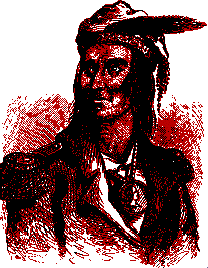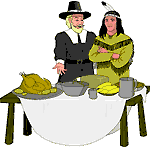 Another Stereotype of the Month entry:
Another Stereotype of the Month entry:
 Another Stereotype of the Month entry:
Another Stereotype of the Month entry:
Here's the annual Indian-bashing Columbus Day column by an alleged libertarian....
Columbus helped all of us find a better way—yes, the natives, too
October 12, 2005 1:06 am
WASHINGTON—Many critics argue that Christopher Columbus gave us a devil's bargain. In October 1492 that Italian explorer, working for Spain, opened America to his fellow Europeans. The result, say the critics: We got a prosperous New World by impoverishing, enslaving, and murdering the natives who were already here.
But this view fails to distinguish between two types of exploitation—one over other humans, and the other over nature. The former should be expunged from our moral codes and civilized society; the latter is the essence of morality and civilization.
The former form of exploitation was suffered especially by the tens of millions of individuals who inhabited the pre-Columbian lands from Mexico through South America. Cortes the Conquistador, for example, defeated the Aztec rulers of Mexico. Many of the tribes that were subject to the Aztecs sided with Cortes; they hated the Aztecs for, among other things, their practice of cutting the living hearts out of members of tribes that they subjugated, as sacrifices to their gods.
Cortes imposed his rule on the Aztecs and their subjects alike, replacing one tyranny with another. The natives were treated harshly and many forced to work as de facto or actual slaves for their new masters.
On the other hand, many settlers, especially in North America (which had far fewer natives), took a different path. They came to the New World to build their own lives. They did not prosper by conquering other men but, rather, by conquering nature.
They had to clear the land, plant and sow crops. They had to practice the trades of carpenters, masons, loggers, miners, blacksmiths and tailors to build their towns and to create the necessities for life and prosperity.
In the centuries that followed, their descendants—including Americans today—built the richest, most prosperous country on Earth.
Today it is chic among back-to-nature types to idealize the pre-Columbian natives and question whether what we have today constitutes real progress. This silliness was given philosophical credence by the 18th-century thinker Jean-Jacques Rousseau's notion of the "noble savage." No doubt many individual natives were as noble as one could be in savage circumstances—but America before Columbus was no Eden.
Let's put aside the wars between tribes, the outright brutality and the like, and just look at the daily lives of the Indians before Columbus. Life was lived simply, in primitive cycles. Natives inhabited crude hovels and hunted or used subsistence farming to sustain themselves.
Yes, they could enjoy family and friends, tell tales of bringing down buffalo, and imagine that the stars in the sky painted pictures of giant bears and other creatures. The ancestors of Europeans did the same.
But true human life, either for an individual or society, is not an endless, stagnant cycle. Rather, it is a growth in knowledge, in power over the environment, and in individual liberty.

Perhaps many pre-Columbian natives were content with their lot in a simple, animallike existence. But what of young Indian children who wondered why family members sickened and died and if there were ways unknown to the shamans to relieve their pain or cure them? Or if there were ways to build shelters that would resist bitter winters, stifling summers and the storms that raged in both seasons?
What about those who wondered whether there were ways to guarantee that food would always be abundant and starvation no longer a drought away, or why plants grow, and what those lights in the sky really were; and whether they could ever actually fly like birds and observe mountains from the height of eagles?
Where were the opportunities for these natives?
Three ideas from Enlightenment Europe provided keys to true human life. First was the idea that we as individuals have a right to our own dreams and desires, that we are not simply tied to a tribe or the wishes of others—that civilization means that individuals are free to live their own lives, as long as they acknowledge the similar freedom of others.
Second was the understanding that through the rational exercise of our minds we can truly discover the nature of the world around us, replacing myths—no matter how beautiful or poetic—with real knowledge.
And third was the appreciation that such knowledge allows us to bend nature to our wills. Through our thoughts and actions we gain the pride of achieving the best within us.
The clash between the cultures of pre-Columbian natives and European immigrants certainly produced injustices for natives. But it would have been unjust for those natives to expect the immigrants to hold themselves to the level of primitive cultures and beliefs.
The true long-term tragedy is that so many of the descendants of the pre-Columbian peoples in North America ended up on reservations rather than integrated into a society that offers opportunities for each individual to excel.
Columbus opened a whole new land for those who would tame nature and build a new, free, and prosperous nation. We should celebrate the opportunity for America that he gave us—not apologize for it.
EDWARD L. HUDGINS is executive director of the Objectivist Center.
Copyright 2005 The Free Lance-Star Publishing Company.
A correspondent replies
From Jason Spaulding:
It is depressing to read trash like this; it reflects the ignorance purveyed in schools under the guise of history. Among other fallacies, it reduces hundreds of tribes to a common denominator. Some of the tribes were warlike; many others, as in most of California, had no war tradition.
Europe at the time of Columbus was no hotbed of prosperity nor intellectual progress. The Renaissance came about largely as the result of the gold stolen from the New World which enabled capitalism and the formation of a new leisure class. The vast majority of Europeans in 1492 were serfs, bound to the land in perpetuity. Not one person in 500 had the equivalent of even a high school diploma by today's standards. The medical care available to the average European was probably inferior to the medical care available to the average Indian.

Rob's reply
>> The former form of exploitation was suffered especially by the tens of millions of individuals who inhabited the pre-Columbian lands from Mexico through South America. <<
So begins the fudgins' from Hudgins. He's trying to use the depredations of the Aztec and Inca empires to excuse the depredations of the Spanish empire.
True, these empires were monarchies that treated their subjects harshly. I doubt the number was in the millions, but thousands of Indians suffered under them.
But tens of millions of Indians were not under the sway of the Aztecs or any other empire. The Europeans decimated all the hemisphere's people—not just the Aztecs' victims—and replaced their independence with dependence. No amount of "progress" justifies that.
>> Many of the tribes that were subject to the Aztecs sided with Cortes <<
True...
>> they hated the Aztecs for, among other things, their practice of cutting the living hearts out of members of tribes that they subjugated, as sacrifices to their gods. <<
...and not necessarily true. My impression is that the tribes in central Mexico bought into the Aztecs' sacrificial religion, even if they didn't want to be sacrificed personally.
It may have worked like our draft in wartime. People didn't want to go fight and die, but they usually went willingly because they believed in the system.
>> Cortes imposed his rule on the Aztecs and their subjects alike, replacing one tyranny with another. <<
In most of North America, Europeans replaced freedom with tyranny. What a "civilized" achievement.
>> On the other hand, many settlers, especially in North America (which had far fewer natives), took a different path. They came to the New World to build their own lives. They did not prosper by conquering other men but, rather, by conquering nature. <<
Wrong. If we're talking about the English settlers on the East coast, they generally fought wars with the Natives within a couple decades of their arrival. Conquest was a fundamental part of their approach from the beginning.
>> They had to clear the land, plant and sow crops. They had to practice the trades of carpenters, masons, loggers, miners, blacksmiths and tailors to build their towns and to create the necessities for life and prosperity. <<
They often had to beg, borrow, and steal the "necessities for life and prosperity" from the Indians.
>> In the centuries that followed, their descendants—including Americans today—built the richest, most prosperous country on Earth. <<
Yes, by taking the Indians' land and forcing them into poverty.

>> Today it is chic among back-to-nature types to idealize the pre-Columbian natives and question whether what we have today constitutes real progress. <<
I'm not a back-to-nature type and I question whether what we have today constitutes real progress. Illegal wars killing innocent civilians, illegal spying on innocent citizens...what's not to question?
Let's not forget that the Nazis considered themselves the pinnacle of Western civilization. And who's to say they weren't? We defeated them by firebombing Germany and nuking Japan, two great moments in "civilization."
America wasn't Eden...and Europe was?
>> No doubt many individual natives were as noble as one could be in savage circumstances—but America before Columbus was no Eden. <<
What "savage circumstances": the lack of lords and kings, priests and popes, dictating every facet of life? America was closer to Eden than Europe was at the time.
>> Let's put aside the wars between tribes, the outright brutality and the like <<
Yes, let's, since they weren't representative of the whole.
>> Life was lived simply, in primitive cycles. <<
And the problem with simplicity is...what? Why exactly do people return to nature (resorts, parks, camping) when they go on vacation? Because living simply offers the maximum amount of pleasure—of relaxation and recreation?
>> Natives inhabited crude hovels and hunted or used subsistence farming to sustain themselves. <<
So did most Europeans at the time. Besides, the so-called "crude hovels" provided enough warmth and comfort or the Indians would've built something better. When the situation called for sturdy longhouses or multistoried pueblos, they built those instead.
>> Yes, they could enjoy family and friends, tell tales of bringing down buffalo, and imagine that the stars in the sky painted pictures of giant bears and other creatures. The ancestors of Europeans did the same. <<
Great. So the Indians enjoyed all the advantages of Europe and none of the drawbacks.
>> But true human life, either for an individual or society, is not an endless, stagnant cycle. Rather, it is a growth in knowledge, in power over the environment, and in individual liberty. <<
Who says Indian life was stagnant? Almost by definition, a civilization evolves from what came previously. The Aztec, Maya, and Inca empires all grew out of the cultures that preceded them. So did the civilizations of the Mississippi mound-builders and the ancestral Puebloans (the Anasazi). So did the Iroquois Confederacy of Nations.
If these civilizations didn't last...so what? Neither did the glories of Greece and Rome. After Rome fell, Europe supposedly degenerated into barbarism, the Dark Ages, and remained stagnant for 1,000 years. How is that a testament to its "growth"?


See Multicultural Origins of Civilization for more on the subject.
The Indians showed how capable they were of evolving when they quickly adopted the Europeans' horses and guns. When they readily traded and negotiated agreements with the interlopers. When they gave up their old ways of life and took up new ways of life.
Funny to hear Hudgins argue that Indians didn't have "power over the environment." Most critics argue that Indians weren't nature-lovers because they did exercise power over the environment. See Dennis Prager and The Ecological Indian for one such argument.
As for individual liberty...with the possible exception of a few short-lived empires, the Indians were generally free. Why would they need "growth" in "individual liberty" when they already had no oppressive laws, churches, or governments?
>> Perhaps many pre-Columbian natives were content with their lot in a simple, animallike existence. <<
Wow...comparing Indians to animals. According to Hudgins, Indians lived in hovels, grubbed for roots, mated and died, etc. With racist comments like this one, I guess things haven't changed much in 500 years.
Those poor, helpless Indians
>> But what of young Indian children who wondered why family members sickened and died and if there were ways unknown to the shamans to relieve their pain or cure them? <<
What should the shamans have done...called a European quack to bleed the patient to death? Natives probably knew more about medicine than Europeans did in 1492. People are still learning about their holistic cures that treat the mind as well as the body.
>> Or if there were ways to build shelters that would resist bitter winters, stifling summers and the storms that raged in both seasons? <<
I don't know how you'd prove it, but I doubt Indians froze to death or died of heat prostration more often than Europeans did.
>> What about those who wondered whether there were ways to guarantee that food would always be abundant and starvation no longer a drought away, or why plants grow, and what those lights in the sky really were; and whether they could ever actually fly like birds and observe mountains from the height of eagles? <<
They wondered just like their European counterparts did. Indians already knew more about farming than most Europeans did. They tracked the stars and planets as well as the Europeans did. The Europeans were 400 years away from flying in airplanes just as the Indians were.
>> Where were the opportunities for these natives? <<
Where were the opportunities for the poverty-stricken, disease-ridden Europeans? Why have people labeled America the "land of opportunity" for centuries if Europe was so wonderful? Why did so many Europeans leave their homes forever to join the primitive colonists (and Indians) if life in America was so terrible?
>> Three ideas from Enlightenment Europe provided keys to true human life. First was the idea that we as individuals have a right to our own dreams and desires, that we are not simply tied to a tribe or the wishes of others—that civilization means that individuals are free to live their own lives, as long as they acknowledge the similar freedom of others. <<

Ironically, European philosophers got many of their ideas about freedom from the Indians. See Indians Gave Us Enlightenment for details.
>> Second was the understanding that through the rational exercise of our minds we can truly discover the nature of the world around us, replacing myths—no matter how beautiful or poetic—with real knowledge. <<
Most of that happened in the Age of Enlightenment, which began in the 1700s. Two centuries earlier, when the Europeans met the Indians, one could say they were equally "irrational" and "superstitious."
>> And third was the appreciation that such knowledge allows us to bend nature to our wills. Through our thoughts and actions we gain the pride of achieving the best within us. <<
One could argue at length with the proposition that "bending nature to our wills" is good. But the fact is that the Indians shaped their environment when they needed to. They provided for their people while not destroying the world around them, which puts them ahead of most Westerners.
>> But it would have been unjust for those natives to expect the immigrants to hold themselves to the level of primitive cultures and beliefs. <<
Was it unjust of those Natives to expect Europeans to abide by their word? To uphold their laws and treaties? I guess "civilization" means "might makes right," because that has been America's guiding principle for most of its history.
>> The true long-term tragedy is that so many of the descendants of the pre-Columbian peoples in North America ended up on reservations rather than integrated into a society that offers opportunities for each individual to excel. <<
The Indians tried integration—i.e., assimilation—for a century or so. It didn't work. The present policy of asserting their tribal sovereignty and heritage is working better.
>> Columbus opened a whole new land for those who would tame nature and build a new, free, and prosperous nation. We should celebrate the opportunity for America that he gave us—not apologize for it. <<
Columbus opened a whole new land for those who would lie, cheat, and steal to take it. These liars and thieves built a "new, free, and prosperous nation" on the backs of Indians, slaves, and the working poor. We should apologize for that, not celebrate it.
Related links
This ain't no party: a Columbus Day rant
The myth of Western superiority
Native vs. non-Native Americans: a summary
|
. . . |

|
All material © copyright its original owners, except where noted.
Original text and pictures © copyright 2007 by Robert Schmidt.
Copyrighted material is posted under the Fair Use provision of the Copyright Act,
which allows copying for nonprofit educational uses including criticism and commentary.
Comments sent to the publisher become the property of Blue Corn Comics
and may be used in other postings without permission.